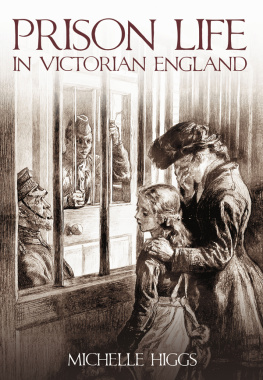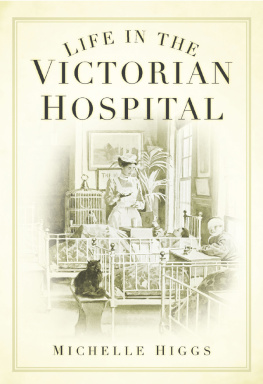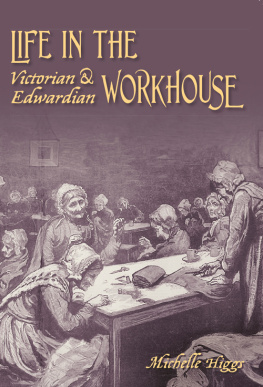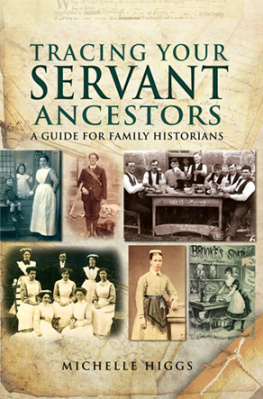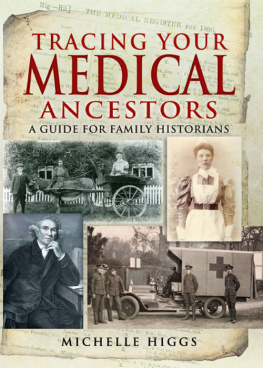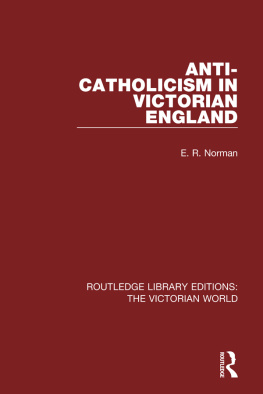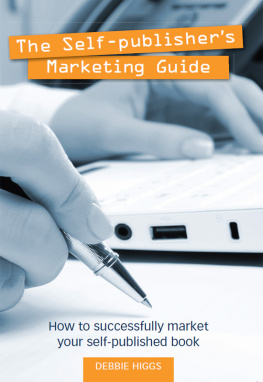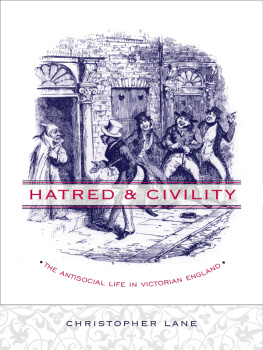First published in 2014 by

an imprint of
Pen & Sword Books Ltd
47 Church Street
Barnsley
South Yorkshire
S70 2AS
The right of Michelle Higgs to be identified as author
of this work has been asserted by her in accordance with
the Copyright, Designs and Patents Act 1988.
Copyright Michelle Higgs, 2014
ISBN:- 9781781592830
PDF ISBN:- 9781473836228
EPUB ISBN:- 9781473834460
PRC ISBN:- 9781473835344
A CIP catalogue record for this book is
available from the British Library.
All rights reserved. No part of this book may be reproduced
or transmitted in any form or by any means, electronic or
mechanical including photocopying, recording or by any
information storage and retrieval system, without permission
from the Publisher in writing.
Printed and bound in the UK by CPI Group (UK) Ltd,
Croydon, CRO 4YY
Pen & Sword Books Ltd incorporates the imprints of Pen &
Sword Archaeology, Atlas, Aviation, Battleground, Discovery,
Family History, History, Maritime, Military, Naval, Politics,
Railways, Select, Social History, Transport, True Crime, and
Claymore Press, Frontline Books, Leo Cooper, Praetorian
Press, Remember When, Seaforth Publishing and Wharncliffe.
For a complete list of Pen & Sword titles please contact
PEN & SWORD BOOKS LIMITED
47 Church Street, Barnsley, South Yorkshire, S70 2AS, England
E-mail:
Website: www.pen-and-sword.co.uk
Contents
Acknowledgements
While writing this book, I received help and advice on locating information and illustrations from a number of different sources.
For this assistance, I would like to express my gratitude to the staff of Cadbury Research Library: Special Collections, University of Birmingham; The Sainsbury Archive, Museum of London Docklands; Durham County Record Office; and to Paul Jarman of Beamish, The Living Museum of the North.
I would also like to thank Jackie Depelle, Jackie Reid and Sue Wilkes who were so generous with their time and their research, and my editor, Jen Newby for her thoughtful suggestions and attention to detail.
Finally, I would like to thank my husband Carl for his continued patience and support, and my family and friends for their encouragement during the writing of this book.
ILLUSTRATIONS
Every effort has been made to trace copyright-holders of images included in this book. The publishers would be grateful for further information concerning any image for which we have been unable to trace a copyright-holder.
Introduction
The parks, the churches, the gardens, the theatres, the markets, the people, the streets, the carriages, the bridges, the exhibitions, the fairs, the bazars [sic], the customs, the manners, all are full of interest, and keep ones senses and imagination continually upon the stretch; and yet I have scarcely begun to see what is to be seen.
(Henry Colman, European Life and Manners, 1850)
This was the American author Henry Colmans reaction when he visited London for the first time, but it could apply to any place or decade in Victorian England. This book allows you to follow in his footsteps and explore this fascinating country yourself.
The Victorians were brilliant inventors of many things we take for granted today cameras, telephones and bicycles to name a few so prepare to be amazed! This handy guide will help you to survive in a very different era. It tells you almost everything youll need to know during your trip, including the correct etiquette at a dinner party, how to use a bathing machine, and what to do if you fall ill. Certain items will help you to blend in and keep you safe, so dont forget to pack the following:
A hat everyone wears a hat, whether rich or poor, so to passers-by, youll look positively naked without one.
An umbrella yes, the weathers still temperate, so an umbrella will shelter you come rain or shine. It also makes a good, makeshift weapon if you need to protect yourself from pickpockets or unwanted attention, or if you inadvertently get into a fight.
Lots of handkerchiefs these are useful for covering your face when the noxious smells of sewage and slime get too strong; theyre also handy for wiping dirt, mud and excrement from your shoes or hems.
Insect powder this kills bedbugs and fleas, ensuring you have a better chance of getting a good nights sleep; theres a strong possibility that youll need it at your hotel or lodgings.
Indigestion pills these are indispensable after a heavy Victorian dinner of numerous courses, plus entres and desserts, but they are often mild laxatives too, so be prepared!
Armed with these five essentials, youre ready to explore. Off you go
Weave your way through the crowds at the market where youll find well-dressed middle-class ladies and gentlemen in their finery, rubbing shoulders with the smart but shabbier working classes. The tantalising smell of hot coffee wafts from a stall on your left, which is percolating nicely with that of fresh, steaming horse manure just yards away on the cobbles. There are so many stalls that its hard to take it all in. Gleaming tin pots and pans, live songbirds in cages, second-hand corsets: you can buy practically anything at the market.
Hundreds of shouting voices, shrill and deep, mingle together, trying to tempt customers to purchase their wares. Turnips, a penny a bunch!, Beautiful Yarmouth bloaters, three a penny! and Wholl buy my chestnuts, a penny a score!. In the distance, the jaunty music of a barrel-organ starts, but its drowned out by someone playing a tuba.
Out of the corner of your eye, you spot a young, shoeless urchin stealing a few red apples from a stall; he makes a run for it through the throng of shoppers and sellers. The wizened old woman who runs the stall protests loudly and in the hue and cry that follows, no-one notices when the moustachioed gentleman standing nearby has his pocket picked, relieving him of his green silk handkerchief and his money. Welcome to Victorian England, where youll need your wits about you at all times
Chapter One
Getting Your Bearings
You will not have gone a hundred paces along the street with a valise or bag in your hand, without having a band of street boys and loafers at your heels. They are all on the look-out for a chance of earning a penny, if you confide your luggage to them to carry, or of disappearing round the corner with it, if you turn your back an instant. If you require to cross the road, a beggar in rags will step in front of you, and sweep away the mud out of your path with his broom. You will come across these poor devils in the most fashionable quarters.
(Max ORell, John Bull and His Island, 1884)
Arriving on a busy Victorian street is a bewildering and intimidating experience, and an assault on the senses. There is a cacophony of noise: the lusty cries of street sellers like costermongers, muffin-men, and flower-girls; the clip-clop of horses hooves on cobblestones and the jingle of their harnesses; the impromptu performances by dancers and street musicians with barrel-organs and hurdy-gurdies; and the voices of the crowds jostling for space along the half-made pavements and muddy streets churned up by horse-drawn vehicles.
The noise of the street is at times overpowering to a person of weak nerves, and the confusion indescribable, wrote David W. Bartlett in What I Saw in London (1853). The policeman with his leather-topped hat and baton is busy giving an order here, assisting there, and exercising in a laughable manner his authority.



